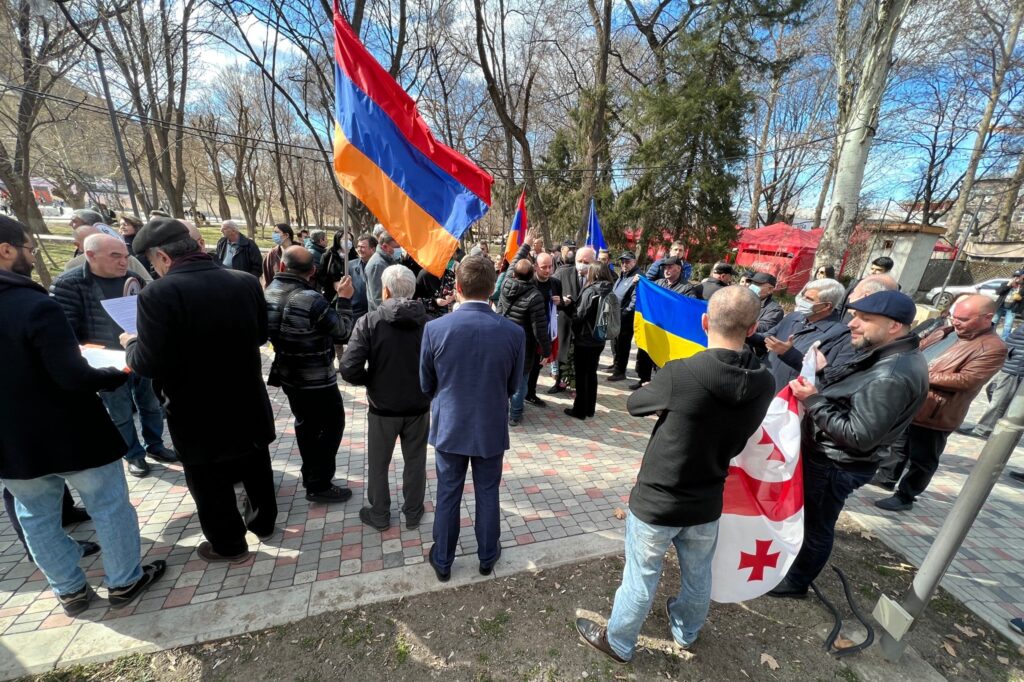Since Russia’s invasion of Ukraine, the world seems to be more united against Russian imperialism than ever. However, in Armenia, people have found themselves lost between deep-seated feelings of trauma and apathy, with analysts suggesting that the country suffers from a case of Stockholm syndrome.
The recent war over Nagorno-Karabakh between Armenia and Azerbaijan, Russia’s presence and influence in Armenia, as well as Ukraine’s support of Azerbaijan, have kept Armenia and Armenians mostly silent on the events that unfolded following Moscow’s recognition of the independence of Donetsk and Luhansk.
Yet, for many, this silence is justified.
During the first week of the war, two small demonstrations were held in Yerevan in support of Ukraine. The first was organised in front of the Russian embassy on the day of the invasion by the European Party of Armenia, a minor party with no MPs. The second was organised by the Ukrainian Embassy on 27 February next to the memorial of Taras Shevchenko — a Ukrainian poet and political figure.
The Armenian Government and its officials have remained largely silent on Russia’s actions. The only statement so far confirmed that Yerevan did not plan on recognising the independence of Donestk and Luhansk, with hopes that Russia and Ukraine might find a ‘peaceful solution’ to the conflict.
Walking a thin line
On the international scene, Armenia stood alone in supporting its strategic ally and main security guarantor by voting against suspending their representation in the Council of Europe.
[Read more: Armenia stands alone in support for Russia in Council of Europe]
But in two more recent votes — to suspend Russia from the UN Human Rights Council and in condemning the invasion in the UN General Assembly — Armenia abstained.

The inconspicuous shift in Armenia’s position in these two cases may be seen as ‘major progress’, Daniel Ioannisyan, a democracy watchdog based in Yerevan thinks. ‘But this, only in the context of Amenia’s dependence on Russia’.
‘Armenia is in such a sad situation regarding its sovereignty and independence from Russia that this silence is already a good thing’, Ioannisyan told OC Media.
He referred to Armenia’s political dependence on Russia, which includes its membership in the Russian-led Eurasian Economic Union and Collective Security Treaty Organisation as its country’s main economic and security partnerships. Armenia and Russia also have a separate strategic partnership agreement that regulates the presence of rgw Russian military base and troops in Armenia.
Armenia has become more dependent still on Russia following the Second Nagorno-Karabakh War, which ended with Russian mediation and the deployment of over 2,000 Russian peacekeepers to the area. Thus, the Armenia-controlled parts of Nagorno-Karabakh appeared to be under de facto control of Russia. In addition, the number of Russian troops in Armenia reached roughly 10,000 with a permanent military base in Gyumri, a military airport in Yerevan, as well as other minor strategic positions. Russian troops are also in control of the Armenia-Turkey border.
‘[Armenia has] struggled to maintain a strategic “balance” between its security partnership with Russia and its interest in deepening ties with the EU and the West over the past twenty years’, Richard Giragosian, the director of the Regional Studies Center, a Yerevan-based think tank told OC Media.
However, Giragosian thinks that Russia will likely start demanding greater support and more open loyalty, in which case, ‘any sense of diplomatic balance may be lost, threatening to push Armenia into a vulnerable and isolated position on the wrong side of history’.
‘Although Armenia’s position, as the only other country besides Russia to oppose that move, dangerously isolates it, there was little choice and even less of an alternative’, Giragosian said.
Considering Armenia’s middling position between support and condemnation of Moscow’s actions, there’s a fear that the sanctions set for Russia may fall on, or at least influence, Armenia too.
Ioannsiyan thinks that the rather real scenario is that Armenia will be affected not because of the sanctions but rather by Russia’s expected attempts to use Armenia and other countries to bypass these sanctions.
‘In this case, there may be bad consequences for Armenia’.
In a hypothesised scenario where Russia would emerge the victor in the war, Ioannsiyan warned that Armenia may be forced into the process of forming the ‘Soviet Union 2.0.’
People, weapons, and propaganda
The response of the Armenian population has not differed much from the government, remaining largely distinct from much of the world.
Aram Amirbekyan, a pro-peace activist and journalist, said that regardless of anything else, the reactions among Armenians were logical.
‘Unfortunately, many were even happy with what was happening’, Amirbekyan said, adding that these people were justifying their apathy with Ukraine’s support of Azerbaijan during the 2020 war.
‘I can’t share this kind of response, as this [Russia’s invasion] is aggression that should be condemned, but the “enemy-ally” propaganda was so strong in Armenia that a reality was created where people support Russia’, Amirbekyan told OC Media.
‘Ukraine, in this context, was perceived as an enemy that sells weapons and white phosphorous to Azerbaijan.’
‘But so did Russia. Everyone sells weapons to everyone’, he added.
According to the Stockholm International Peace Research Institute, Russia provided over 60% of Azerbaijan’s weapons between 2011 and 2020, while Ukraine only sold over 1% during the same time, though before 2010 that number was significantly higher.
A common rumour surrounding Ukrainian support to Azerbaijan was that Kyiv provided Baku with white phosphorous that was used by Azerbaijan during the Second Nagorno-Karabakh War.
Film director Sarik Andreasyan — a former friend of Ukrainian President Volodymyr Zelenskiy’s — was one of several to perpetuate such rumours, which Zelenskiy has categorically denied.
Russian media and propaganda also played a significant role in the formation of Armenian public opinion, with over 11% of Armenians considering Russian state media outlets trustworthy sources of information, according to Daniel Ioannsyan who cited a survey ordered by the Union of Informed Citizens.
‘This, among other things, influences public opinion, and unfortunately, its support of Putin’s actions. And Armenia should work intensively against disinformation campaigns’.
One such recent ‘campaign’ following the start of the Russian invasion of Ukraine was the staged draping of a 50-metre banner that read ‘Russian army’ from one of Yerevan’s largest bridges — the Kyivian.

Though instantly becoming viral with hundreds of thousands of views, local journalists established that the sign was only hung for nine minutes to be filmed before being taken down.
Recent events in Armenia, including the 2018 revolution and the Second Nagorno-Karabakh War, have also changed perceptions in Armenia. Those events made Armenians more ‘politicised’, Aram Amirbekyan says. ‘And on the background of this, the events in Ukraine are perceived as part of these geopolitical perceptions’.
Armenia’s response as a state was also logical for Amirbekyan. ‘It’s hard to expect from Armenia, as a state, explicit support for Ukraine as Russian troops are in Karabakh as the direct guarantor of the security of the people there’.
‘I would like to see more. I would like to see Armenia in such a geopolitical situation to be able to directly condemn this aggression and colonial-imperial policy’, Amirbekyan concludes. ‘But I’m happy that it was able to keep some sort of neutrality’.
‘At the same time, […] we should notice that there’s compassion in Armenia towards the people in Ukraine’, he added.
‘After all, there are many Armenians in Ukraine, relations between the countries and people were quite warm. The sight of Kyiv or Lviv shelled is painful for Armenians too’.
Ready to receive refugees
According to estimates, there are almost 400,000 Armenians and people with Armenian roots in Ukraine, while officially, Armenians in Ukraine number at around 130,000. Russia, on the other hand, has the largest Armenian population — 1.2 million.
Both Armenia’s Foreign Ministry and the head of the Armenian community of Ukraine have said that there is no exact information on how many Armenians have fled the war or how many have entered Armenia.
However, the ministry has expressed a willingness not only to receive ethnic Armenians and Armenian citizens, but also foreign refugees.
The Ministry of Economy has also established a group to help Armenians, Russians, Belarusians, and Ukrainians intending to move to Armenia. This includes a simplified procedure of relocating companies registered in those countries to Armenia.
According to Minister of Economy Vahan Kerobyan, about a dozen Russian companies are already relocated to Armenia.
‘Several companies are on their way. In general, many companies have applied, dozens or hundreds of companies’, Kerobyan said. Most of them are from the IT sector.
Kerobyan said that the government was trying to make the country a ‘pleasant environment’ for foreigners who move, or will be moving, with their families, in parallel to providing an appropriate business environment.




 4 March 2022
4 March 2022




